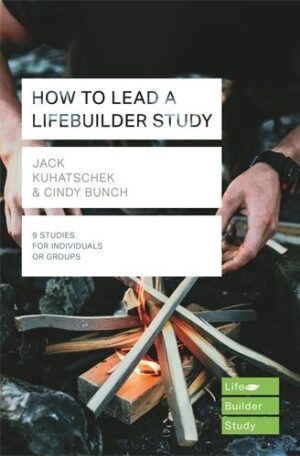



You will probably want to begin your small group with dinner or an informal social gathering. During your first meeting, try to discover people’s interests and needs. Begin by asking whether they would prefer to study a biblical book, character or topic.
Beware of being swayed by one individual’s pet peeves or pet topics. Select a study topic and format that will meet the needs and interests of the majority. And if a topic is too complex and out of your depth, don’t be afraid to admit it. I find that whenever I ask a group what they want to study, the answer that comes back is Revelation. That is an exciting book to study together but may not be the best starting place for a group! Request that you begin with a simpler study.
During the first meeting, you may wish to ask how the Bible has helped the people in the group. As they describe their own history with the Bible, group members will have a chance to get acquainted with one another in more than a superficial way. It will also prepare the way for the decision about what to study together.
Books are meant to be read from beginning to end. Can you imagine how confusing it would be to read a page out of Tom Sawyer, a line from Hamlet, then a paragraph from War and Peace? They wouldn’t make any sense! Yet many people try to study the Bible that way. Book studies allow you to see biblical stories or ideas in context and to follow them from beginning to end.
If your group would like to study a biblical book, discuss which Old or New Testament books they are most interested in.
Keep in mind the needs of the group. If it consists of new Christians or people with only a vague grasp of Scripture, it would probably be unwise to study Ezekiel. Stick with something that is easier, shorter and more foundational.
The Gospel of Mark is a good place to learn more about the person and work of Christ. It is the shortest of the Gospels and is full of action.
Shorter New Testament epistles, such as Galatians, Ephesians, Philippians, Colossians, James and the letters of Peter, are also good choices. They are fairly easy to understand, and their message is basic and practical. For a leadership group, consider 1 and 2 Timothy or Titus.
Old Testament books such as Joshua, Ruth, 1 Samuel, Nehemiah, Amos and Jonah are popular. You might begin with something short, like Jonah or Ruth; then attempt something longer, such as Joshua or Nehemiah.
Character studies can also be fascinating. Who can forget the stories of Noah and the flood, Abraham’s sacrifice of Isaac, Joshua and the battle of Jericho, or Daniel in the lions’ den? Character studies allow us to observe God at work in the lives of various men and women.
The Old Testament is a rich resource for character studies. Genesis, for example, looks at the lives of Abraham, Isaac, Jacob and Joseph. Moses is obviously the key figure in the book of Exodus. Judges looks at such people as Deborah, Gideon and Samson. First Samuel considers Hannah, Eli, Samuel, Saul and David. The books of Ruth, Nehemiah, Esther and Jonah are character studies in themselves.
The New Testament also contains many interesting characters. In the Gospels you might consider studying Mary the mother of Jesus, or Joseph, her husband. Mary’s relative Elizabeth and her husband, Zechariah, also have much to teach us. The sisters Mary and Martha of Bethany are popular for character studies too.
The book of Acts focuses primarily on the lives of Peter and Paul. But you also encounter such people as Stephen, Philip and the Ethiopian, Cornelius, Barnabas, Apollos, Priscilla and Aquila.
Some groups prefer to study a topic. Some basic ones to consider are evangelism, prayer and decision making. You might also study about Christian character, Christian disciplines, missions or social responsibility. Or you might want to study about a shared life experience like singleness or marriage.
It can be a powerful experience for seekers to come together with Christians and study the Bible. Three LifeBuilders are designed especially with seekers in mind: Meeting Jesus, Jesus the Reason and Encountering Jesus. In each of these guides the study questions are appropriate for both seekers and Christians. And the applications are written with seekers in mind as well. Each focuses on the Gospels and is designed to present an opportunity for people to discover who Jesus is by reading the Bible for themselves.
There are several important reasons for using a study guide as the basis for your discussion, whether you study a book, character or topic.
One important reason is time. It takes a considerable amount of time to write a good set of discussion questions. Three to four hours per week is probably the average. Most discussion leaders cannot easily afford that much time in preparation.
Another reason is quality. Those who write these guides are usually trained in Bible study and have some expertise in the subject they are writing about. On the other hand, it is the exceptional discussion leader who has both the skill and the knowledge to write an effective study guide.
Study guides also allow the group to prepare in advance. We strongly recommend that each member of the group has a guide. If they can study and make notes in the guide before the discussion, their preparation will greatly enhance your discussion. Even without preparation, the guide allows them to record insights during the study.
In a good study guide, the questions are clearly written, interesting and thought-provoking. Good questions generate discussion rather than simply call for one-word answers. They draw out the content and meaning of the passage. Each study will also have at least two or three questions that apply the passage to daily life.
There are ten to fourteen questions on the Scripture text, which is usually sufficient for a study lasting from forty-five minutes to an hour. (More time is needed for group discussion at the opening and prayer at the end.) If your time is limited, you may want to mark a couple of questions that can be skipped or summarized if necessary.
Be sure that the main impact of the study (often brought out by the final questions) is not missed!
LifeBuilders focus on only one or two passages per study rather than hopping from passage to passage, so that the group can focus on one particular part of Scripture at a time and thus begin to get a better picture of the whole.
Finally, look for the leader’s notes at the back of each guide to give you added biblical background and tips on group dynamics.
Bring several different guides to the first meeting. You might spread them out on a table or pass them around. This usually makes it much easier for the group to decide what they want to study. Once they have chosen a guide, you can order a copy for each person.
One small group chose to study 1 Timothy for the first few weeks. This provided a brief book, easy to get through—so only a short-term commitment was needed to get the group going. They then renewed the commitment and turned to the second part of the guide—2 Timothy and Titus. Then they wanted to spend some time in the Old Testament and studied Jonah. Character studies came next, focusing on the lives of David and the women of the New Testament. By then they had completed a year’s worth of curriculum. With sixty-six books and so many characters and topics to choose from, they have only scratched the surface of what they may cover in the future!